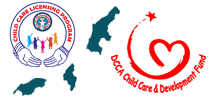Background Check Requirement
Background Check Requirements for Licensed Day Care Center & Group Child Care Homes, Before and After School Programs, Family Child Care Homes, and Infant and Toddler Child Care Centers
Pursuant to the Northern Mariana Islands Administrative Code Title 55 and more specifically §55-40.1-226: (d) All applicants, their employees, and anyone else at the facility whose activities involve the care or supervision of children or unsupervised access to children shall provide a criminal background check.1
(1) The criminal background check shall include the following:
(i) A fingerprint background check from any available CNMI Government criminal database.
(ii) A fingerprint background check done on any available federal database as recommended by the FBI.
(iii) A criminal background check on the CNMI Government Child Abuse and Neglect Registry.
(iv) A criminal background check on the National Sex Offender Registry if the CNMI Government has the capability of accessing this.
(v) An annual CNMI Police Clearance.
(2) These checks shall be done before a person is allowed to work or perform service at the daycare
facility.
Child Care Development Block Grant Act of 2014
In addition to the above requirements, the Child Care Development Block Grant (“CCDBG”) Act of 2014 also requires states and territories to conduct criminal background checks for all child care staff members, including staff members who don’t care directly for children but have unsupervised access to children. This requirement is applicable to certified centers receiving subsidy from the Child Care and Development Fund.
Who are subject to the CCDBG Act of 2014 Criminal Background Checks
Individuals subject to the criminal background checks are those employed by a provider for compensation; contracted employees and self-employed; those who care for, supervise, or have unsupervised access to children in care; and adults living in a family child care home.
When and how often do I have to go through the Criminal Background Checks?
The comprehensive criminal background checks are required prior to employment and must be conducted at least every 5 years thereafter from the initial check. However, if you have been separated from employment as a child care provider for more than 180 days, then you are subject to the full criminal background check.
What checks are required under the CCDBG Act of 2014?
The criminal background checks are broken down into three primary categories.
1. National Background Checks:
a. National Federal Bureau of Investigation criminal history check with
fingerprint.
b. National Crime Information Center (NCIC) Sex Offender Registry (NSOR)
check.
2. In-state (CNMI) Background Checks:
a. In-state Criminal History Check, with fingerprint.
b. In-state Sex Offender Registry Check.
c. In-state Child Abuse and Neglect Registry Check.
3. Inter-state (out of the CNMI) Background Checks:
a. Inter-state Criminal History Check.
b. Inter-state Sex Offender Registry Check.
c. Inter-state Child Abuse and Neglect Registry Check.
What are the disqualifying crimes under the CCDBG Act of 2014?
The CCDBG Act of 2014 specifies disqualifying crimes or actions only for child care providers and staff members who are serving children receiving CCDF assistance. The following are disqualifying criteria’s:
a. Refusing to consent to a criminal background check.
b. Knowingly making a materially false statement in connection with the
background check.
c. Is registered, or is required to be registered, on a State sex offender registry
or repository or the National Sex Offender Registry established under the
Adam Walsh Child Protection and Safety Act of 2006 (42 U.S.C. 16901 et
seq.).
d. Has been convicted of a felony consisting of murder (as described in section
1111 of title 18, United States Code, child abuse or neglect, crimes against
children (including child pornography), spousal abuse, crime involving rape or sexual assault, kidnapping, arson, physical assault or battery, or a drug-
related offense committed during the preceding 5 years
e. Has been convicted of a violent misdemeanor committed as an adult against
a child inclusive of child abuse, child endangerment, sexual assault, or of
misdemeanor involving child pornography.
1 Although not specifically stated in the Child Care Licensing Program Administrative Code, a reasonable person would reasonably understand that unsupervised access to children is the potential to be left alone with any child or group of children in care.

